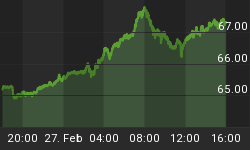What is the significance of the fact that Verizon on Wednesday managed to sell $49bln in bonds without any kind of hiccup?
Obviously, it means that the corporate market is doing okay, that investors who are starved for good spreads like the attractive spread the bonds were priced at, and that there is reasonable confidence in the marketplace that Verizon can succeed even as a much more-leveraged company. All are good things.
But here is another thing to think about. My friend Peter Tchir, who writes the excellent T-Report, noted this morning that "Investors weren't selling other bonds to buy Verizon." That is, a fair amount of the money may well have been coming out of cash to go into the Verizon bonds.
Why does this matter? Remember that the velocity of money is the inverse of the demand for real cash balances. That is, when everyone is holding cash, the velocity of money is low; when no one wants to hold cash, the velocity of money is high. I have shown the chart below (source: Enduring Investments) before and argued that higher interest rates will tend to increase velocity by decreasing the demand for real cash balances. At least, that usually is what happens.

What would a turn higher in velocity look like? Well, I think it may well look something like this. "I no longer have to reach as much for yield and take all the risk I had to in March to get a 3% yield. So it's time to invest some of this cash."
Now, the ultimate flows get a little confusing, because cash is neither created nor destroyed in this transaction. Cash is transferred to Verizon from investors; Verizon then transfers that to Vodafone investors, who perhaps put it back in the bank for no net change. But if those investors in turn say "I don't want those cash balances, either," and then go invest or lend it or spend it, then you're starting to see how money velocity is increasing. The money essentially becomes a kind of financial "hot potato" now, moving more rapidly from investor to investor, from consumer to vendor, and so on. The volume of transactions rises, which increases prices and output as explained by the MV≡PQ monetarist credo.
And that is how higher rates can produce more inflation.
We are seeing other strange things, too, that could be consistent with this explanation. Another great blog, "Sober Look," observed last week that 30-year jumbo mortgage loan rates have fallen below conforming mortgage loan rates. Their explanation of the phenomenon is worth reading, but note this part: "Flush with deposits, banks have access to extraordinarily cheap capital and are seeking to earn more interest income." Yet this has been true for some time. What has changed is that interest rates are now higher, increasing the opportunity cost of cash in both nominal and real terms.
This doesn't automatically mean that money velocity is increasing; it may just be an interesting bond sale and unusual market activity in jumbo mortgages. But it is worth thinking about, because as I note in that article linked to above, even a modest rise in money velocity could produce an aggressive response from inflation.
You can follow me @inflation_guy!
Enduring Investments is a registered investment adviser that specializes in solving inflation-related problems. Fill out the contact form at http://www.EnduringInvestments.com/contact and we will send you our latest Quarterly Inflation Outlook. And if you make sure to put your physical mailing address in the "comment" section of the contact form, we will also send you a copy of Michael Ashton's book "Maestro, My Ass!"















